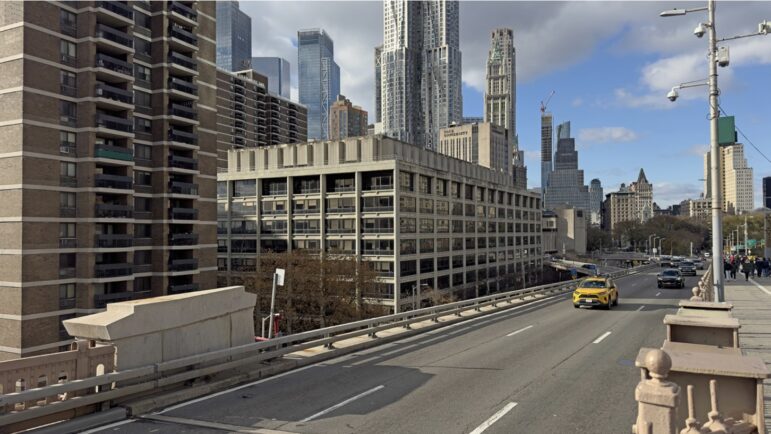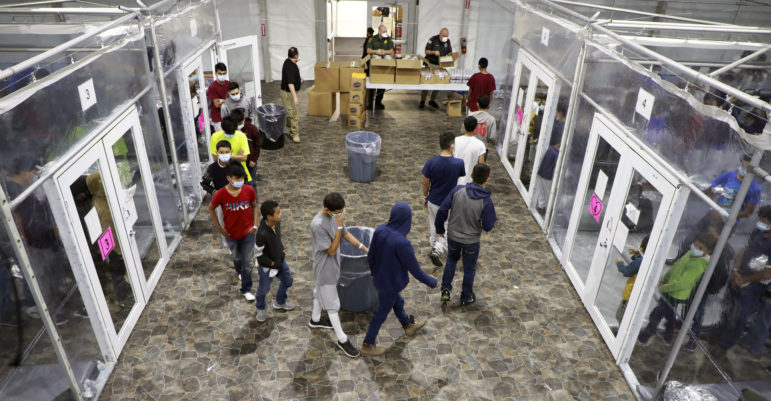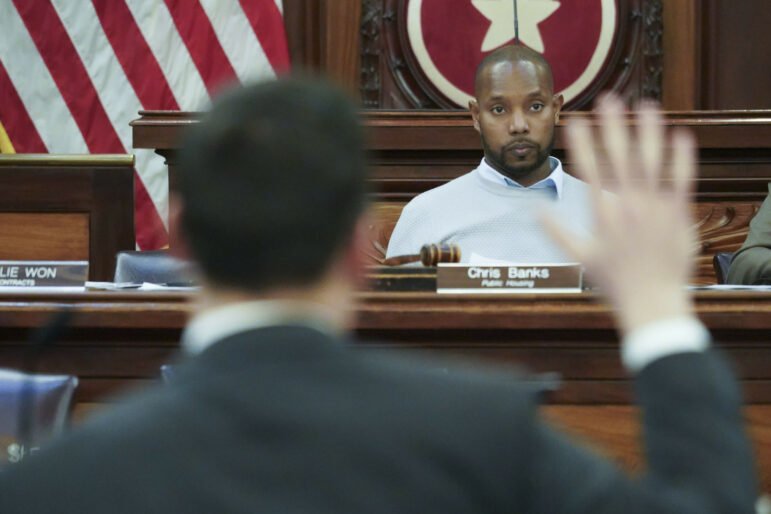God saved Liu Zhu’en’s life. He was smuggled out of China to New York a decade ago, at age 19–an ordeal that gained him $24,000 of debt and a painful disorder in his legs from the beatings he got when he didn’t pay quickly enough. “It was so bad I started to think about how to kill myself,” he says of his early days here. But then Jesus came into his life.
“I had been living next to the Church of Grace on Allen Street. The people there had been helping me, sometimes paying my medical bills, visiting me in the hospital,” Liu explains. “One day, when the pain was so bad I didn’t know what to do, I went to the church and prayed. I gave my life to Jesus. I think that’s when things started to turn around.” The pain continued, but Liu shouldered it better, managing to work sporadically. He quit thinking about suicide and embraced his new American life.
Every week, Chinatown’s Church of Grace, as well as the smaller New York House Church, is filled with hundreds of people like the young Liu: Fuzhounese immigrants who arrive here in isolation and land at the bottom of Chinatown’s economic ladder, but who find both material and emotional support inside a massive and growing informal network of conservative Protestants.
In the 1990s, Chinese immigrants ranked third among New York City’s new arrivals. Unlike previous waves of Chinese immigration–which came largely from the Guangdong province and its capital city, Guangzhou, known as Canton in those days–this mass migration stemmed primarily from the towns around a southeastern port city called Fuzhou. The word among the Fuzhounese is that some 300,000 immigrants from the region now make their home in the United States, with 60,000 to 70,000 in New York City at any given time. These estimated figures are difficult to corroborate. No comprehensive demographic survey exists. Nor is it clear one could ever be accurate, given the transience of the community’s large population of undocumented workers.
For most Fuzhounese immigrants, Chinatown is the first stop in America. Here they connect with family, housing and jobs. But while Chinatown is a gateway, for many Fuzhounese it is also a trap, an ethnic enclave manufactured by the neighborhood’s Mandarin- and Cantonese-speaking economic and political elites to keep them isolated and easy to exploit.
In April 1992, the Church of Grace bought an old bathhouse on Allen Street at a public land auction. Opened at the turn of the century to serve Jewish and Italian immigrants who lived in tenements without hot water or bathing facilities, the bathhouse was originally built as part of an effort to better the moral character of immigrants by improving their hygiene. Ninety years later, it was reborn as a spiritual center to ease this latest group of migrants’ path to eternal salvation.
From its beginning, the Church of Grace has worshipped in Fuzhounese. In the 1950s, the Chinese government introduced Mandarin as the dialect of instruction in the public schools and national media. But for rural Chinese–and most Fuzhounese fit that category–Mandarin is just a second or third language learned after their local one. So here, board meetings are conducted in Fuzhounese, as is most informal conversation. It is often the only language older members speak. In a neighborhood dominated by Cantonese and Mandarin speakers, this common language is a significant unifying factor, and as a result the Church of Grace has established a distinct identity as “the Fuzhounese church.”
The church’s physical design reflects rural Protestant churches everywhere in China: simple and unadorned. The pews are hand hewn of plain wood, varnished and cushionless. The stark white walls deliberately lack ornamentation.
At 11 a.m., as the 90-minute service begins, the sanctuary is packed with 350 people. Another 60 sit on folding chairs in the foyer watching the service on closed-circuit television, as do another 70 in the church’s social hall upstairs. In the basement, three tiny Sunday School classes squeeze in nearly 50 children. The mailing list has well over 2,000 names, with addresses all over the country, including some detention centers. The Fuzhounese population is highly transient and attendance reflects this fact–pews are consistently filled, but participants change from week to week.
Globalization theorists would call the Church of Grace and the New York House Church “nodes of access”–links to a web of social and economic relations that spread from this New York entry point throughout the city, across the country, and eventually back to China.
The foyer of the Church of Grace is for its members a place of transition between one reality and another. Outside they are derided as uncultured “country bumpkins,” or tubaozi; inside they celebrate the common heritage of an exploring people. Outside they are itinerant workers moving from city to city; inside they find a place for reconnection. Outside they are one step from imprisonment and deportation; inside they are exhorted to remember that while a U.S. green card would be nice, only God’s green card will get them into heaven.
Over bowls of noodles served after worship, conversations roar with news of home, jobs and places to live. A member of the Board of Deacons passes along a videotape from Fuzhou soliciting funds from overseas compatriots for his church. A group of college students meets in a corner to discuss their upcoming exams. These diffuse interactions create the feel of a community center, and they’re the source of the support people like Liu find here.
In the fall of 1999, a deacon at the church’s Brooklyn branch proposed to the board a way to harness this informal network’s potential for civic engagement: create the Church of Grace Social Service Corporation. He suggested the congregation open its own company, employ members for fair wages working under decent conditions, and attach a day-care center for children whose parents would otherwise be forced to send them back to China. Complete silence filled the room when the deacon finished speaking.
Officially and publicly, the church rarely addresses the earthly problems its members confront. Things like grinding work conditions, mental illness and oppressive indebtedness do make the pages of the church newsletter, but they typically serve as background for testimonials of miraculous healing or exhortations to pray for relief. The church may be the focal point for an extensive informal network of mutual assistance, but the congregation provides few formal services to address the community’s needs.
Fuzhounese Protestantism is theologically conservative, emphasizing faith, not good works, and personal, not collective, salvation. Church leaders focus on the power of the Holy Spirit and the love of God to comfort people in their distress. As one older female deacon says: “Jesus has taken my bitter life and given me rest and comfort in my sadness.” This is a place primarily concerned about the soul, not the body.
Moreover, in China the official religious domain is limited to personal devotion and congregational activities focused on piety; domains of power and social action are reserved for the state. Having grown up in that environment, most church leaders have little experience enacting social service programs, and therefore have been reluctant to break new ground with their seemingly fragile congregation.
But a couple of years ago, Rev. Chen Zhaoqing took over as senior pastor. Born in Malaysia, he’s a child of the Fuzhounese diaspora who came to the U.S. as a missionary to Chinese college students in Texas. He envisions a more civically engaged church in Chinatown, and has fired up a scattershot of programs.
He’s started an early Sunday, English-language service–distinctly lacking in Fuzhou flavor–that’s attended primarily by recent immigrants wishing to hear English. There are also weekly English-as-a-Second-Language classes. A bulletin board for job postings and apartment listings has been revived, after succumbing several years earlier to members’ complaints that “a church should not be an employment agency.” Representatives of a neighborhood women’s health program occasionally set up a table in the lobby to schedule consultations on issues ranging from HIV testing to nutrition.
These developments are not the radical organizational response suggested and dismissed a few years ago. But they do reflect a slow expansion of the church’s narrow personal evangelism into a broader civic one, combining public concerns with individual salvation. “Things are changing here,” Rev. Chen explains. “We don’t know how to address all these needs, but we are beginning to try.”
Kenneth J. Guest is the author of God in Chinatown: Religion and Survival in New York’s Evolving Immigrant Community. This essay is excerpted from his book.








